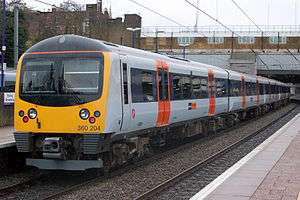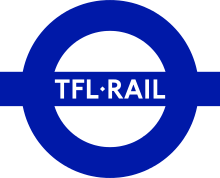Heathrow Connect
Heathrow Connect was a train service in London provided jointly by Heathrow Express and Great Western Railway (GWR), between Paddington station and Heathrow Airport. The service followed the same route as the non-stop Heathrow Express service but called at certain intermediate stations, connecting several locations in West London with each other, the airport, and Central London. It ran every half-hour throughout the day and evening. The service was launched on 12 June 2005 and ceased on 19 May 2018, when it was absorbed into the TfL Rail franchise, in advance of becoming part of the Elizabeth line in 2021.
 Class 360 Desiro at Ealing Broadway in 2011 | |
| Overview | |
|---|---|
| Franchise(s) | Open access operator Not subject to franchising 12 June 2005 - 19 May 2018 |
| Main route(s) | London Paddington – Heathrow Airport terminal 4 |
| Fleet size | 5 Class 360s |
| Stations called at | 8 |
| Parent company | Heathrow Airport Holdings First Great Western |
| Reporting mark | HC |
| Successor | TfL Rail |
Company
Structure
Heathrow Connect had a complex operating structure: Heathrow Airport Holdings (formerly BAA) supplied the rolling stock and on-board staff through its Heathrow Express subsidiary, and owned the track from Airport Junction to the terminals. GWR collected the revenue for journeys between Paddington and Hayes & Harlington, while Heathrow Airport Holdings collected the revenue for journeys between Hayes & Harlington and Heathrow.[1]
Fares
Fares between Paddington and Hayes & Harlington were the same as for GWR services, but the single fare between Hayes and Heathrow was £6.30 as of January 2018. Oyster cards, Travelcards and Freedom Passes were not valid between Hayes & Harlington and Heathrow, but could be used throughout the rest of the route. When the service was first introduced in 2005, the fare for the 3-mile (4.8 km) journey from Hayes to Heathrow was £6, which at £2 per mile made it one of the most expensive train journeys in the world.[2]
The service was designed principally for the use of airport staff and West London residents for travel to Heathrow or Paddington. With a staff ID card, discounted fares were available for the journey between Hayes and Heathrow.[3]
Heathrow Connect was marketed as a cheaper way to reach Paddington from Heathrow and vice versa, with a single fare of £10.30 (less than half the Heathrow Express fare, but almost double the price of a London Underground journey) and a journey time of 25 minutes against the Express time of 15 minutes. Passengers were also permitted to use their Railcards to access discounts. Originally it was not intended to be used as a cheaper (but slower) alternative to the Heathrow Express service from Paddington to Heathrow: every Connect service was overtaken by an Express service en route, and at Paddington trains were originally advertised on departure boards as running to Hayes & Harlington only. Standard-class travel between Heathrow Airport terminals was free, and this included Heathrow Connect services.
Operations
Route
Heathrow area rail services | |||||||||||||||||||||||||||||||||||||||||||||||||||||||||||||||||||||||||||||||||||||||||||||||||||||||||||||||||||||||||||||||||||||||||||||||||||||||||||||||||||||||||||||||||||||||||||||||||||||||||||
|---|---|---|---|---|---|---|---|---|---|---|---|---|---|---|---|---|---|---|---|---|---|---|---|---|---|---|---|---|---|---|---|---|---|---|---|---|---|---|---|---|---|---|---|---|---|---|---|---|---|---|---|---|---|---|---|---|---|---|---|---|---|---|---|---|---|---|---|---|---|---|---|---|---|---|---|---|---|---|---|---|---|---|---|---|---|---|---|---|---|---|---|---|---|---|---|---|---|---|---|---|---|---|---|---|---|---|---|---|---|---|---|---|---|---|---|---|---|---|---|---|---|---|---|---|---|---|---|---|---|---|---|---|---|---|---|---|---|---|---|---|---|---|---|---|---|---|---|---|---|---|---|---|---|---|---|---|---|---|---|---|---|---|---|---|---|---|---|---|---|---|---|---|---|---|---|---|---|---|---|---|---|---|---|---|---|---|---|---|---|---|---|---|---|---|---|---|---|---|---|---|---|---|---|
| |||||||||||||||||||||||||||||||||||||||||||||||||||||||||||||||||||||||||||||||||||||||||||||||||||||||||||||||||||||||||||||||||||||||||||||||||||||||||||||||||||||||||||||||||||||||||||||||||||||||||||
Heathrow Connect used the relief lines of the Great Western Main Line between Paddington and Airport Junction, replacing some stopping services operated by First Great Western Link. As part of the original Heathrow Express project, these lines were electrified at 25 kV AC overhead as a diversionary route, and feature Automatic Train Protection. An additional flyover bridge was built in 2008 as part of Crossrail works to enable trains to enter or leave the airport spur without crossing any of the Great Western Main Line tracks.[4]
Services initially terminated at Heathrow Central. Following Heathrow Express services being diverted to Terminal 5, from March 2008 Heathrow Connect services were extended to Terminal 4.[5][6]
The service pattern, as of October 2016, was as follows:
- Monday-Saturday, Heathrow Connect services ran half-hourly between Paddington and Heathrow Central (for terminals 2 & 3), stopping at Ealing Broadway, West Ealing, Hanwell, Southall and Hayes & Harlington. In early mornings and late evenings, some Heathrow Connect services were extended beyond Heathrow Central to either Terminal 4 or Terminal 5.[7]
- On Sundays, all Heathrow Connect services were extended to Terminal 4, but did not call at West Ealing or Hanwell. Service frequency was also reduced from half-hourly to hourly.[7]
Rolling stock
Heathrow Connect used five-car Class 360/2 electric multiple units. Four were built by Siemens Mobility in Krefeld, Germany for Angel Trains as demonstrator Desiros. One was brought to Northampton Kings Heath Siemens Depot in 2002 before South West Trains' Class 450s were delivered. The others were used at the Wildenrath Test Centre.[8]
All four were purchased by Heathrow Connect and rebuilt before being sent to England.[9][10] A fifth five-car set was delivered in November 2005, but did not enter service until December 2006.[11] A fifth carriage was added to the original four four-car sets in 2006.[12][13]
| Class | Image | Type | Top speed | Quantity | Number | Carriages | Seat Layout | Routes operated | Built | |
|---|---|---|---|---|---|---|---|---|---|---|
| mph | km/h | |||||||||
| Class 360/2 Desiro | .jpg) |
EMU | 100 | 161 | 5 | 360201-360205 | 5 | 2+3 | London Paddington – Heathrow Terminal 4 | 2004–2005 |
Replacement by TfL Rail

On 20 May 2018, TfL Rail took over the services operated by Heathrow Connect as a precursor to the full opening of the Elizabeth line.[14][15] Fares on the line are now integrated into the TfL fare scheme, and therefore match the fare scheme of London Underground services,[16] with the exception of a premium for single journeys to and from Heathrow using Pay As You Go (Oyster and contactless). Passengers are able to use Oyster cards, Travelcards and Freedom Passes to travel between Hayes & Harlington and Heathrow.
Eventually the service will be re-branded as the Elizabeth line and train paths will be extended through the new tunnels at Paddington through Central London, calling at stations such as Bond Street, Liverpool Street and Canary Wharf. When the line opens fully, eastbound trains from Heathrow will terminate at Shenfield or Abbey Wood.[14]
TfL Rail had originally planned to replace the existing Class 360 units with Class 345s, but due to delays with the signalling system in the Heathrow Airport tunnels and late delivery of Class 345 units, a contingency plan has been implemented. The Class 360s will continue to be used between London Paddington and Heathrow, supplemented by two Class 345 trains per hour running between London Paddington and the extended bay platform at Hayes & Harlington,[17] until the Class 360s can be fully replaced.
References
- "Heathrow Connect close to takeoff". Railway Gazette. Sutton: Railway Gazette International. 1 June 2004. Archived from the original on 24 June 2019. Retrieved 24 June 2019.
- "Heathrow ... at a price". The Observer. London. 12 June 2005. Retrieved 26 October 2009.
- Airport Workers Heathrow Connect
- "Crossrail Airport Junction Information Paper" (PDF). 10 January 2008.
- BAA invests in rail so cars don't choke airport growth Railway Gazette International April 2005
- Heathrow Express Railway Technlogy
- "Heathrow Connect - Train Times". Archived from the original on 14 May 2018. Retrieved 21 August 2015.
- Class 350s could be rebuilt Rail issue 472 15 October 2003 page 6
- 360s to use old bodies Rail issue 484 31 March 2004 page 24
- Heathrow Connect plans revealed Entrain issue 31 July 2004 page 38
- Final Hex 360 arrives Today's Railways UK issue 50 February 2006 page 57
- Fifth coaches arrive for Hex 360s Today's Railways UK issue 62 February 2007 page 62
- New 360/2 Vehicles Arrive Rail issue 559 14 February 2007 page 55
- "Elizabeth line". Transport for London. Retrieved 28 April 2017.
- "TfL Rail". Transport for London. Retrieved 28 April 2017.
- https://www.oyster-rail.org.uk/2018/03/elizabeth-line-fares-announced/
- Crossrail Class 345 contingency application
![]()